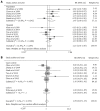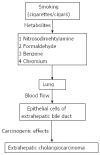Smoking, alcohol consumption, and the risk of extrahepatic cholangiocarcinoma: a meta-analysis
- PMID: 24379600
- PMCID: PMC3870528
- DOI: 10.3748/wjg.v19.i46.8780
Smoking, alcohol consumption, and the risk of extrahepatic cholangiocarcinoma: a meta-analysis
Abstract
Aim: To assess the association between smoking and alcohol consumption and extrahepatic cholangiocarcinoma (ECC) through a meta-analysis of clinical observational studies.
Methods: A literature search was conducted using Embase and MEDLINE databases from inception to 31 May 2013 without language limitations, and by manually searching the references of retrieved articles. Case-control and cohort studies that investigated the association between smoking or alcohol consumption and ECC were included. The quality of these studies was assessed using the Newcastle-Ottawa quality assessment scale. Summary relative risks and corresponding 95%CI were calculated using a random-effects model. Publication bias was assessed by Begg's funnel plot and Egger's test.
Results: A total of 12 eligible articles (11 case-control studies and one cohort study) were included in this meta-analysis. Eleven studies reported the association between smoking and ECC. Pooled analysis indicated that smokers had an increased risk of ECC development as compared with non-smokers (summary RR = 1.23; 95%CI: 1.01-1.50). This correlation was present in population-based studies (n = 5; summary RR = 1.47; 95%CI: 1.06-2.05) but not in hospital-based studies (n = 6; summary RR = 1.10; 95%CI: 0.88-1.37) and in non-Asian regions (n = 7; summary RR = 1.39; 95%CI: 1.03-1.87) but not in Asia (n = 4; summary RR = 1.08; 95%CI: 0.85-1.38). Seven studies reported an association between consuming alcohol and ECC. Pooled analysis indicated that alcohol drinkers had a similar risk of ECC development as did individuals who did not drink alcohol (summary RR = 1.09; 95%CI: 0.87-1.37). There was moderate heterogeneity among the studies and no evidence of publication bias.
Conclusion: Smoking is associated with an increased risk of ECC, but alcohol consumption is not. Further population-based studies, particularly cohort studies, are warranted to enable definitive conclusions.
Keywords: Alcohol consumption; Extrahepatic cholangiocarcinoma; Meta-analysis; Relative risk; Smoking.
Figures





References
-
- Welzel TM, McGlynn KA, Hsing AW, O’Brien TR, Pfeiffer RM. Impact of classification of hilar cholangiocarcinomas (Klatskin tumors) on the incidence of intra- and extrahepatic cholangiocarcinoma in the United States. J Natl Cancer Inst. 2006;98:873–875. - PubMed
-
- Khan SA, Emadossadaty S, Ladep NG, Thomas HC, Elliott P, Taylor-Robinson SD, Toledano MB. Rising trends in cholangiocarcinoma: is the ICD classification system misleading us? J Hepatol. 2012;56:848–854. - PubMed
-
- Shaib YH, Davila JA, McGlynn K, El-Serag HB. Rising incidence of intrahepatic cholangiocarcinoma in the United States: a true increase? J Hepatol. 2004;40:472–477. - PubMed
-
- Wood R, Brewster DH, Fraser LA, Brown H, Hayes PC, Garden OJ. Do increases in mortality from intrahepatic cholangiocarcinoma reflect a genuine increase in risk? Insights from cancer registry data in Scotland. Eur J Cancer. 2003;39:2087–2092. - PubMed
Publication types
MeSH terms
LinkOut - more resources
Full Text Sources
Other Literature Sources
Medical

